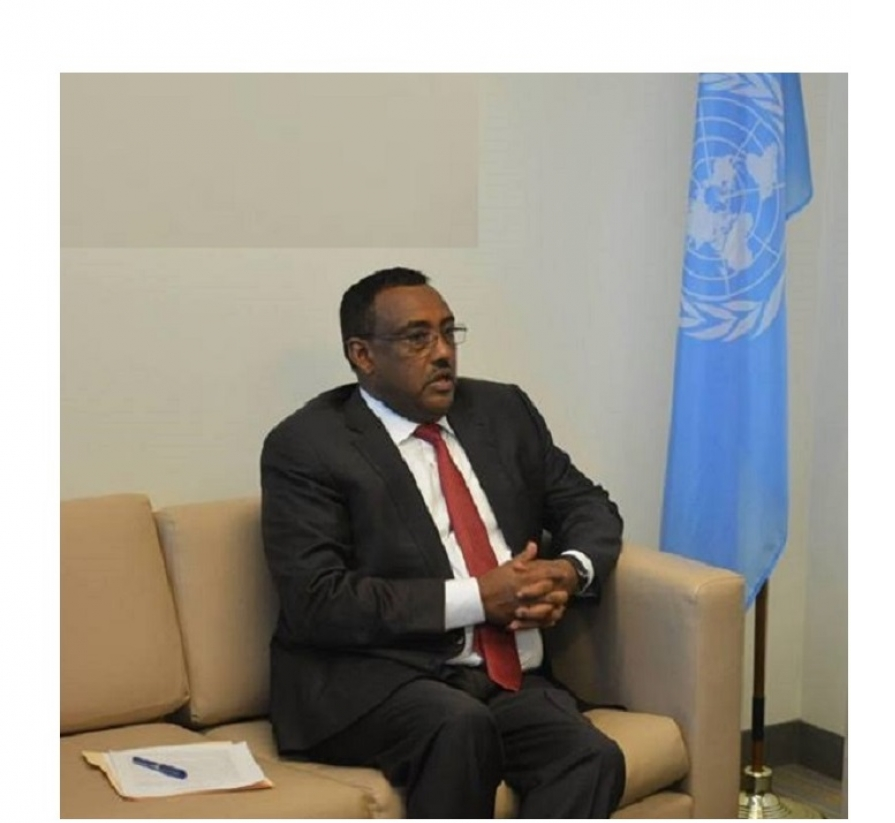Ethiopia Building Resilient Economy to Suppress Adverse Effect of Climate Change: Deputy PM Demeke - ENA English
Ethiopia Building Resilient Economy to Suppress Adverse Effect of Climate Change: Deputy PM Demeke

New York April 22/2018 Ethiopia is taking measures to suppress the adverse effect of climate change and build resiliency at community and national level, and end up emergency drought response, Deputy Prime Minister Demeke Mekonen said. The Deputy PM has briefed UN member states in New York yesterday on the current humanitarian situation in Ethiopia and approaches that are underway to end emergency drought response and build resilient economy. Ethiopia has been registering a double digit economic growth over the last 15 consecutive years and is among the few African countries believed to take the lead in political, economic and social transformation of their respective sub-regions, Demeke stated. This is a clear indication that Ethiopia is on the right track to achieve the vision of reaching a middle income country by 2025, he elaborated. “Despite an impressive economic growth over the decade, Ethiopia because of its geographic location and adverse agro-ecology remains vulnerable to a range of natural and human induced hazards, related risks and disasters,” the Deputy PM pointed out. Demeke added that humanitarian assistance could save the life of drought affected people; however, it could not be sustainable solution as climate change aggravates the situation. Noting that climate change induced hazards and related disasters are expected to rise in the years to come and in the future, he stated that government and partners have agreed the new way of working in which short-term humanitarian assistance and medium to long-term development oriented programs. “As a result Ethiopia has been making a paradigm shift from crisis management to disaster risk management, mainly focusing on disaster risk reduction development programs,” Demeke pointed out. Ethiopia disaster risk management has shown a strong political will to address and tackle the adverse climate change effects, he added. Recalling that Ethiopia has developed an effective national policy and strategy on disaster risk management in 2013, he said “this strategy aims to reduce and eventually prevent and mitigate disaster risk by building a process of mainstreaming disaster risk management policy.” According to him, livestock development and large scale commercial farms to create job opportunities are among the development programs that are playing critical role in reducing risks in the lowlands, where recurrent drought occurs. National Disaster Risk Management Commissioner, Mitiku Kassa said Ethiopia with its development partners have designed the largest Productive Safety Net Program (PSNP) in Sub-Saharan Africa to meet the needs of 7.9 million people. The PSNP aims at preventing household as depletion and building community assets through public works focusing on soil and water conservation, Mitiku added. These development programs are few examples of existing development interventions implemented throughout drought affected areas to build resiliency, the commissioner said, and stressed “they should be strengthened and supported with multi-year financing from partners and the government.” UN Resident Coordinator, Ahunna Eziakonwa-Onochie said Ethiopia is one of the humanitarian assistance recipient countries, where you see the government taking the lion’s share of the contribution. Noting that 1.6 billion USD is required in which most of it is for relief, the Resident Coordinator said “the largest contributor to the appeal so far is the government with 182 million USD committed.” “The Ethiopian government has stepped out and made a significant financial contribution. This is unique and it is quite unusual in our humanitarian world,” she4 appreciated.